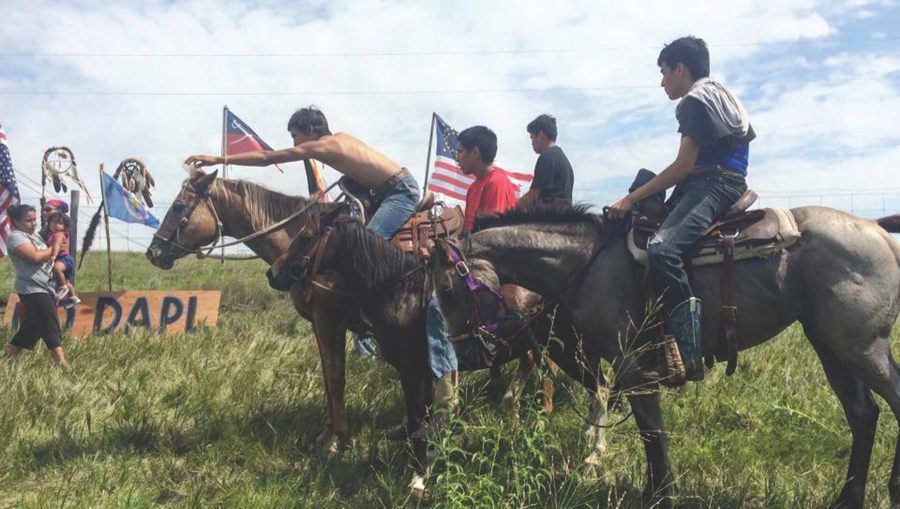Starting with just a few dozen, thousands of people have now been collectively gathering to halt the construction of the Dakota Access Pipeline in protests that have been violently opposed by private security.
After the Keystone XL pipeline proposal was shut down, another oil company, Energy Transfer Partners, found somewhere new to drill. Unfortunately, the newly-proposed pipeline is supposed to carry crude oil from the Bakken Region of North Dakota through South Dakota, Iowa and into Illinois. The route crosses the Mississippi River twice, once one mile upriver from The Standing Rock Sioux Reservation.
Tribe members have opposed the Dakota Access Pipeline to keep their drinking water safe and prevent destruction of sacred sites.
“They’re not thinking about us,” Wiyaka Eagleman told Amy Goodman of Democracy Now in an unpublished interview from a conference last June. “They’ve never thought about us. My family relies on that water source, and the pipeline has the ability to pollute the only clean water we have access to. Where will my little sister play?”
Eagleman and four other Lakota tribe members attended on scholarship as panel members to discuss the current injustices still present within the way that the government handles relations with Native Americans.
In March, protests held a consistent 15 to 35 person attendance. It was not until last month that Standing Rock Reservation began receiving tremendous support from the larger community. There are now over 3,000 people staging protests intended to be peaceful to stop the construction of the pipeline.
Private security guards have been hired, some with security dogs and pepper spray. Six people had been bitten and at least thirty pepper-sprayed as of Sept. 5, spokesman for the Standing Rock Sioux tribe Steve Sitting Bear told CBS.
Despite the large crowd and persistence of the people, the construction has not been officially halted. According to a press conference that was held two weeks ago, the police received reports of pipe bombs, shooting and violent protests. The pipe bombs were mistaken with their peace pipes.
“Load them up, send the smoke to our ancestors, that’s what we do to pray,” said Eagleman. “They are now portraying us as violent.”
On Sept. 3, Energy Transfer Partners took a more firm hand with the security.
“We’ve been trying to do our jobs for days now,” Mike McCreary, the driver of one of the bulldozers that has been operating on and off for 5 days now, told The Guilfordian. “It’s just a job to us. I don’t think these people see that. It’s just frustrating. There are better ways to be heard than to stand around screaming.”
What McCreary doesn’t understand is that this is their land and their clean water, not to mention that the Mississippi River provides fresh water to 10 million Americans. If the pipeline were to leak or break, both the Standing Rock Reservation and the Fort Berthold Reservation would experience loss of life.
The federal government administered a temporary restraining order until Sept. 9 that halted some of the Dakota Access Pipeline construction while the judge made a decision about an injunction.
In a strong sense, the people won, but only for now. Eyes, ears and hearts are still open.
“Water is life,” said Eagleman. “We will protect our water, and you should too. We need to raise awareness because our people have been through enough. Fighting for clean water should not occupy three months of our 12.”
At the Camp of the Sacred Stone Facebook page, you can follow stories, photos and news reports of The Sacred Stone Camp. Also included is information regarding donating money and how you can help by sending supplies or food. It is wrong for companies to take advantage of the Sioux people, and we should do what we can to help.









